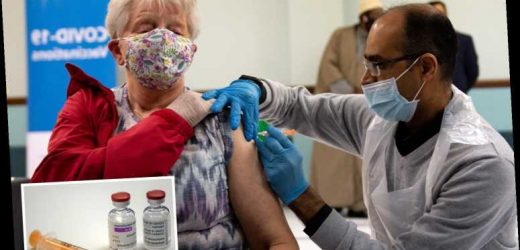OXFORD scientists are working on their Covid jab to assess whether it can deal with emerging coronavirus variants.
Strains from South Africa and Brazil having concerning mutations leaving scientists scrambling to work out if their jabs will be affected.
⚠️ Read our coronavirus live blog for the latest news & updates
Oxford is now undertaking feasibility studies to reconfigure the technology used to make its vaccine, The Telegraph reported, citing confirmation from the university.
The scientists are working on estimating how quickly they could reconfigure their technology, should the challenge ever arise in order to attack new variants.
It is hoped they will be able to make tweaks within 48 hours notice.
A University of Oxford spokesman said: "It is known that viruses constantly change through mutation… These changes are being monitored closely by scientists, and it's important we continue to remain vigilant for changes in the future.
"The University of Oxford is carefully assessing the impact of new variants on vaccine immunity and evaluating the processes needed for rapid development of adjusted Covid-19 vaccines if these should be necessary."
Experts say if the new variants escape the vaccines in use, it should be possible to refashion them in rapid time.
The process of changing the vaccine and getting it into arms would take a few weeks, according to Sir Patrick Vallance, the Chief Scientific Adviser.
Talking to Sky News yesterday, Sir Patrick said: “Fortunately the new vaccine technologies, particularly mRNA [used for the Pfizer and Moderna jabs], are relatively easy to change.
“You dial up a change, It only takes a few weeks for that change to be made. I think that's what we are going to see.
“I wouldn't be at all surprised if we needed slight variations of the vaccine to make sure we keep on top of this. Changes will occur all over the world, viruses mutate, i would expect to see more of that going forward.”
On the need for annual vaccines, Sir Patrick said regular Covid jabs would be needed regularly and potentially have to be changed – as is the case for the flu.
He said: “I think it’s quite likely that we are going to need regular vaccination, at least for a few years, and I think it’s quite likely that those vaccines may need to change a bit as they do for flu every year.”
Meanwhile, Prime Minister Boris Johnson said on Wednesday that the nation’s medicines regulator will be ready and able to give approval to tweaked Covid vaccines amid new variants popping up.
Tory MP Neil O’Brien asked Mr Johnson at prime minister’s questions in the House of Commons about “concerning data from South Africa” that the virus could mutate and thus “dodge the vaccines and reduce their efficacy”.
Mr Johnson said: “We have been talking about that with the scientists over the last days and weeks intensively, just in the last few hours.
“We are confident that the Medicines and Healthcare products Regulatory Agency will be in a position to turn around new applications for new variants of vaccines, as may be required to deal with new variants of the virus.”
The MHRA said: “We are in discussion with vaccine manufacturers on potential modifications that may be needed for current vaccines to be effective against new variants, if required”, according to the Financial Times.
Variants may escape antibodies
It comes after scientists have warned Covid-19 vaccines being rolled out in the UK and around the world may be less effective against the South African strain, known as 501Y.V2.
Both the variants from South Africa and Brazil have a mutation called E484K that is known to essentially evade some antibodies.
The UK variant, found in Kent, does not have this mutation.
A study, which has not yet been peer-reviewed, found the mutations in the South Africa variant may be resistant to immunity from previous coronavirus infection.
Lawrence Young, a virologist and professor of molecular oncology at Warwick Medical School, who was not involved in the research, said: “This preprint suggests that individuals might be able to get infected with a variant of Sars-Cov-2 (the virus that causes Covid-19) even if they have previously had Covid-19.
“It also shows we urgently need to find out if we could see infection with this variant post-vaccination.”
Sir Patrick said there are unanswered questions about variants such as 501Y.V2.
He said laboratory studies suggest “this may be a virus that can escape some of the immune effects of antibodies”, but “we don’t know to what degree”.
Sir Patrick said: “We should get information on clinical effects because vaccinations are occurring in South Africa, they are occurring in Brazil, and they are occurring in other places variants may occur, so we should get some more information on that.
“They are more worrying in the sense they are a little more different in terms of how the immune system may recognise them.
“It is a real issue of concern. It’s something we need to keep an eye on, but we don’t have all the answers yet.
“I would just caution the laboratory studies are not perfect predictors of what happens in the clinic so we need to get clinical data as soon as we can.”
Sir Patrick said there is “we are increasingly of the view that it will be susceptible to the vaccine”.
It comes as recent laboratory tests have indicated that the Covid vaccine developed by Pfizer is likely to work against the UK variant that emerged in Kent, called B.1.1.7.
The researchers said their results indicate its is "unlikely that the B.1.1.7 lineage will escape BNT162b2-mediated (Pfizer/BionTech vaccine) protection".
But it has not yet released findings on the concerning E484K mutation.
BioNTech has said it plans to publish a more detailed analysis of the likely effect of its vaccine on the South African variant within a few days.
Source: Read Full Article





